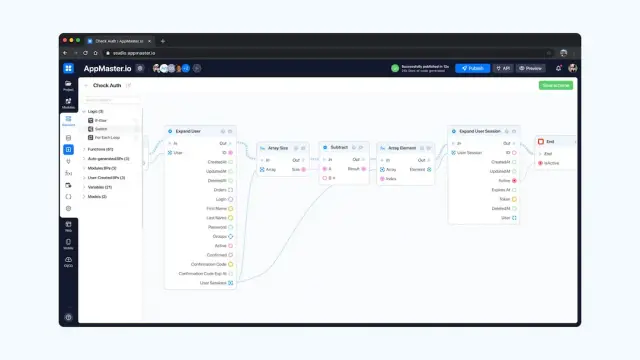The Advantages of No-Code Platforms with On-Premise Support
Explore the numerous advantages of using no-code platforms that support on-premise deployment. Dive into security, customization, control aspects, and real-world examples.

No-code platforms have revolutionized the way businesses build and deploy software applications. Automating the development process empowers non-technical users and citizen developers to create powerful applications with minimal programming knowledge. This has led to rapid development cycles, reduced technical debt, and lower development costs, among other benefits.
Still, one aspect that is sometimes overlooked is the importance of on-premise deployment support in no-code platforms. On-premise deployment involves hosting and managing applications on an organization's own infrastructure rather than relying on a cloud vendor. This enables greater control over applications and data, making it a critical consideration for businesses with strict security, compliance, or customization requirements.
This article explores the advantages of no-code platforms that support on-premise deployment, including enhanced data security and compliance, greater customization and control, and seamless integration with legacy systems.
Enhanced Data Security and Compliance
Data security and compliance are often top concerns when deploying applications in a cloud-based environment. Compliance with various regulatory frameworks, such as GDPR, HIPAA, or other industry-specific regulations, can be challenging when data is stored externally in a cloud vendor's infrastructure.
On-premise deployment of no-code applications solves these concerns by giving organizations full control over their application infrastructure and data storage. This enables in-house IT teams to implement stringent security measures, adhere to data protection laws, and comply with industry-specific regulations more easily.
In addition, on-premise deployment allows organizations to leverage their existing investments in security infrastructure, making it more cost-effective to protect critical data. By hosting applications locally within their infrastructure, businesses can ensure that their sensitive information remains isolated and secure.
Greater Customization and Control
With on-premise deployment, businesses have complete control over their application environment. This allows organizations to fine-tune every aspect of their infrastructure, from network configurations to hardware resources, ensuring optimal performance and meeting specific business needs.
Greater control over the infrastructure also allows for more granular customization, enabling organizations to implement custom features or integrations that a cloud vendor might not support. On-premise deployment allows organizations to customize their applications without restrictions, providing limitless possibilities for expansion and improvement.
Furthermore, on-premise deployment puts the organization in full control over the application's uptime and maintenance schedules. In this setup, businesses can ensure that application updates or maintenance tasks don't disrupt their critical operations. This level of control is particularly crucial for industries with stringent service-level agreements (SLAs) or businesses operating in areas with limited internet connectivity.
On-premise support for no-code platforms offers enhanced data security and compliance and greater customization and control over applications and infrastructure. When choosing a no-code platform, these benefits make on-premise deployment essential for organizations with strict security, compliance, or customization requirements.

Reduced Latency and Improved Performance
On-premise support in no-code platforms can significantly reduce latency and improve the performance of the developed applications. When applications are hosted on the organization's infrastructure, data and resources are closer to the users, which results in faster response times.
Using local infrastructure often means your applications will tap into your organization's optimal network connections, providing a more responsive user experience. This is particularly beneficial for businesses that operate in regions where internet connectivity might be suboptimal or have strict performance requirements, such as real-time communication, online gaming, or financial trading platforms.
Furthermore, on-premise deployment empowers businesses to fine-tune their application hosting environments and tailor them to meet specific needs. As a result, organizations can optimize server configurations, network resources, and storage capacity to ensure their applications provide the best possible user experience. This level of control and customization is difficult to achieve with generic cloud-based hosting options.
Easier Integration with Legacy Systems
Many organizations rely on legacy systems for critical business operations. While these systems may have been efficient in the past, they often become complex and difficult to maintain or upgrade over time. Integrating these legacy systems with new applications can be challenging, especially when dealing with cloud-based technologies.
On-premise no-code platforms make connecting and integrating applications with existing legacy systems easier, as they often reside on the organization's infrastructure. Connecting on-premise applications with legacy systems can help businesses leverage the full potential of their previous investments in hardware and software while benefiting from the agility and cost-effectiveness of no-code solutions.
For example, a business using an older customer relationship management (CRM) system can develop a modern web or mobile app using a no-code platform while still retaining the CRM functionality on their local infrastructure. This avoids expensive migration efforts or complex integration procedures while providing a more seamless and efficient application ecosystem.
Hybrid Deployment Options
Not all organizations can completely transition to on-premise or cloud-based solutions. Some businesses prefer to maintain a hybrid architecture that combines both on-premise and cloud infrastructure, allowing them to balance between security, control, and scalability.
No-code platforms with on-premise support can accommodate this need for flexibility by providing hybrid deployment options. A hybrid approach can be particularly beneficial for businesses with sensitive data, applications that require rigorous security measures, or industries governed by strict regulations. By deploying some components of an application on-premise and others on the cloud, businesses can ensure sensitive data is kept in a controlled environment while utilizing cloud-based services for non-critical components.
Hybrid deployments can also streamline resource management by enabling organizations to allocate necessary resources for specific applications or features more efficiently. For example, a business may deploy its customer-facing web application in the cloud to maximize scalability and user experience but keep sensitive backend services and databases on-premise to ensure security and control.
No-code platforms like AppMaster support hybrid deployment options by allowing customers to get the source code of the applications with their Enterprise subscription. This flexibility enables organizations to tailor their application deployment strategies based on their requirements and constraints, aiding them in achieving the best of both worlds while harnessing the power of no-code technology.
On-premise support in no-code platforms provides businesses with reduced latency, improved performance, easier integration with legacy systems, and flexibility through hybrid deployment options. These advantages make on-premise no-code solutions compelling for organizations seeking to maintain control over their applications and data while reaping the benefits of no-code development. AppMaster, a powerful no-code platform, supports on-premise deployment and hybrid configurations, enabling businesses to create powerful, scalable, and efficient applications that cater to their unique requirements.
Real-World Examples of On-Premise No-Code Solutions
With the growing popularity of no-code platforms and the increasing demand for on-premise deployment support, several real-world examples of businesses have benefited from leveraging these solutions. Here are a few such instances:
Financial Institutions
Banks and financial organizations often deal with sensitive financial information and are subject to strict regulations like GDPR and HIPAA. By adopting on-premise no-code platforms, these organizations can build applications quickly, maintain full control over their data and infrastructure, and ensure compliance with relevant industry regulations.
Healthcare Providers
Hospitals and healthcare facilities handle confidential patient information that must be protected under various data protection laws. On-premise no-code platforms allow these providers to develop custom applications while ensuring the highest level of privacy and security for sensitive patient data.
Government Agencies
Government bodies face stringent requirements to protect sensitive data from unauthorized access. On-premise no-code platforms enable them to streamline their operations and automate processes while adhering to strict data security standards.
Manufacturing Companies
With a focus on speed and efficiency, manufacturing firms seek ways to optimize their workflows, streamline communication, and automate various business processes. On-premise no-code platforms enable these organizations to build custom applications without compromising security or control over their proprietary information.
AppMaster: Empowering On-Premise No-Code Deployment
AppMaster is an innovative no-code platform that goes above and beyond in addressing the needs of businesses requiring on-premise deployment. Recognizing the growing demand for data security, customization, and greater control, AppMaster enables organizations to harness the full potential of no-code development without compromising their essential requirements. Some of the key features that make AppMaster an excellent choice for businesses seeking on-premise no-code deployment include:
- Enterprise Subscription: AppMaster offers an Enterprise subscription plan where customers can access application source code, enabling them to host the applications on their own infrastructure. This ensures complete control over deployment and data management while taking advantage of AppMaster's efficient no-code platform.
- Seamless Integration with Legacy Systems: With the ability to access application source code and binary files, businesses can easily integrate AppMaster-built applications with their existing on-premise legacy systems, streamlining operations and leveraging existing investments in hardware and software.
- Support for PostgreSQL-compatible Databases: AppMaster applications can work with any PostgreSQL-compatible database as the primary database. This flexibility allows businesses to work with databases that suit their needs, ensuring seamless integration with their existing infrastructure.
- Outstanding Scalability: AppMaster utilizes Go (Golang) for backend applications, delivering excellent performance and scalability, making it an ideal solution for enterprise-level and high-load use cases.

Future Trends in No-Code Platforms with On-Premise Support
As the world of no-code platforms continues to evolve, the integration of on-premise support stands out as a key trend shaping the future of this technology. Several notable developments are anticipated in the sphere of no-code platforms with on-premise capabilities.
- Advanced Security Measures: Future iterations of no-code platforms with on-premise support will likely prioritize even more strong security features. This includes enhanced encryption protocols, multi-factor authentication, and comprehensive access controls, ensuring that organizations can maintain the highest data protection standards within their own infrastructure.
- Hybrid Cloud Deployments: Anticipated trends suggest a move towards hybrid cloud deployments, where no-code platforms seamlessly bridge on-premise infrastructure and cloud services. This flexibility will empower organizations to leverage the benefits of both environments, addressing specific requirements while harnessing the scalability offered by cloud resources.
- Integration with Emerging Technologies: No-code platforms are expected to integrate more seamlessly with emerging technologies such as artificial intelligence, machine learning, and the Internet of Things (IoT). This integration will empower users to build sophisticated applications without the need for extensive coding, opening doors to innovative solutions in various industries.
- Enhanced Collaboration Capabilities: Collaboration is key in modern workplaces, and future no-code platforms with on-premise support will likely focus on enhancing collaborative features. Real-time editing, shared workflows, and collaborative debugging tools will become integral, fostering teamwork among users with varying technical backgrounds.
- Greater Customization Options: As organizations seek more tailored solutions, future no-code platforms will likely provide increased customization options. Users will have the flexibility to adapt the platform to specific industry requirements, creating applications that align precisely with their unique business processes.
- Improved Scalability: Scalability remains a crucial aspect of any technology, and future no-code platforms are expected to further enhance scalability features. This will ensure that applications developed on these platforms can seamlessly grow in tandem with the evolving needs and size of the organization.
- Focus on User Experience (UX): The user experience will be central in future developments. No-code platforms will aim to provide an intuitive and user-friendly environment, making it even more accessible for non-technical users to contribute to the development process actively.
- Global Accessibility: No-code platforms with on-premise support will likely become more globally accessible. This includes improved language support, compliance with diverse regulatory standards, and considerations for various cultural contexts, making these platforms versatile for a wide range of users worldwide.
As these trends materialize, the synergy between no-code development and on-premise support is poised to reshape how organizations approach application development, offering a powerful combination of simplicity, security, and adaptability.
Final Thoughts
On-premise support for no-code platforms is essential for organizations prioritizing data security, compliance, customization, and control. While most no-code platforms are cloud-centric, solutions like AppMaster allow businesses to host their no-code-built applications on their infrastructures while benefiting from the inherent advantages of no-code development.
As the demand for no-code solutions continues to grow, it is crucial for businesses to carefully evaluate the available options and select platforms that prioritize their unique requirements. By doing so, organizations can empower their teams, streamline workflows, and unlock the full potential of no-code platforms with on-premise support.
FAQ
No-code platforms offer rapid application development, lower development costs, reduced technical debt, and simplified maintenance. They enable citizen developers and non-technical users to develop applications with minimal programming knowledge.
On-premise deployment refers to hosting and managing applications on an organization's own infrastructure rather than using a cloud provider. This allows businesses more control over their applications and data.
On-premise support offers enhanced data security and compliance, greater customization and control, improved performance, easier integration with legacy systems, and hybrid deployment options.
On-premise deployment gives organizations full control over data storage and infrastructure, ensuring compliance with industry regulations and data protection laws. It also enables them to implement stringent security measures to safeguard critical data.
With on-premise deployment, applications are hosted on local infrastructure, which can lead to reduced latency and better performance for users. This is particularly beneficial for businesses with stringent performance requirements or those operating in regions with poor internet connectivity.
A hybrid deployment combines on-premise and cloud-based infrastructure to host and manage applications. This approach allows organizations to use cloud services for some features while maintaining control over critical data and functionality in an on-premise environment.
On-premise support allows no-code platforms to easily connect and integrate with existing legacy systems, as they often reside on the organization's infrastructure. This makes it convenient to interconnect on-premise applications with existing systems while leveraging previous investment in hardware and software.
AppMaster offers enterprise-level subscription plans that provide customers with the source code for their applications. This allows organizations to host and manage applications on-premise, ensuring complete control over deployment and data management while benefiting from AppMaster's no-code capabilities.





